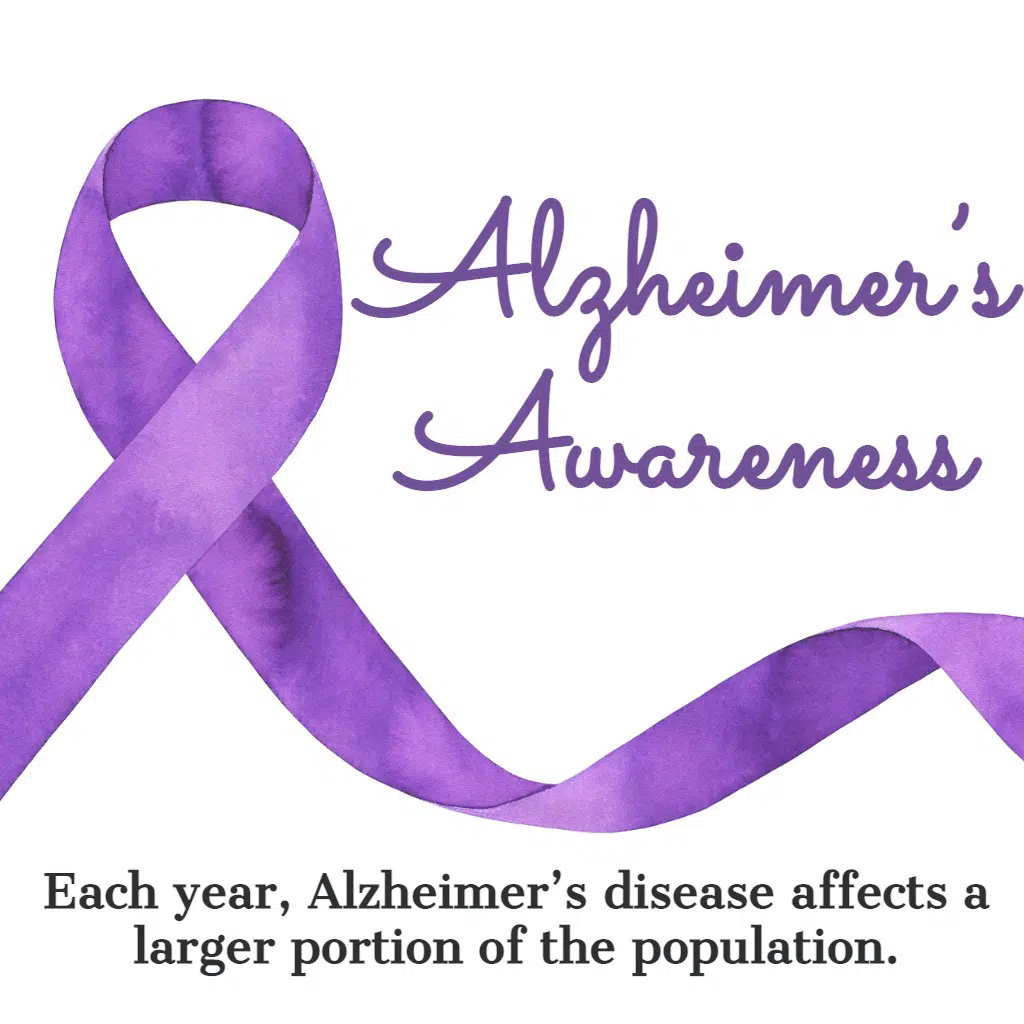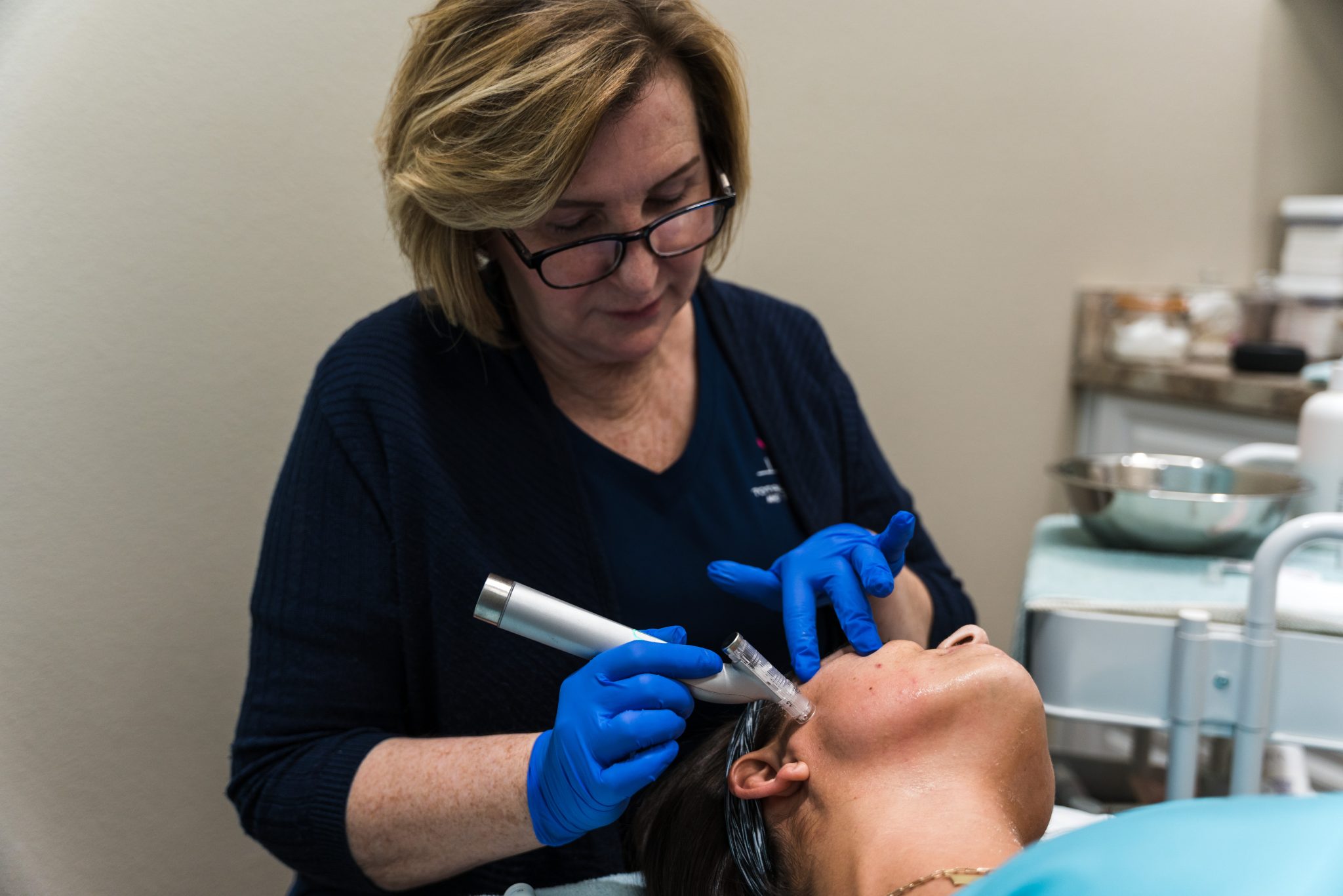A healthy diet and exercise offer a great start on your journey to total health…

Functional Medicine and Brain Health: Fighting Alzheimer’s
November is national Alzheimer’s disease awareness month. Total Nutrition & Therapeutics is going all in to spread awareness about the disease, its causes, and preventative measures. Fighting Alzheimer’s has never been so important.
Nearly 2% of our elderly population, ages 65 and older, live with Alzheimer’s disease. As if this weren’t enough, the number of people experiencing early onset Alzheimer’s—those 65 and under—is rising at an alarming level. “The Alzheimer’s Association recently featured a speaker who was 28 years old,” says Bren Davis. Davis has personal experience with Alzheimer’s after seeing the disease in her mother, her husband’s grandmother, an aunt and uncle, and even her kindergarten teacher, who contracted the disease at age 62.
To Bren, few things are more important than Alzheimer’s awareness. Here at Total Nutrition & Therapeutics, we feel the same way.
Bren Davis: From Alzheimer’s Awareness To Impassioned Advocate
It Runs In The Family
Bren Davis’s mother was diagnosed with type II diabetes before she moved to the memory section of her assisted living facility. This comes as no surprise to today’s Alzheimer’s experts, who have found that Alzheimer’s disease is highly related to the brain’s inability to transport blood. Type II diabetes exacerbates this problem, such to the point that experts have begun referring to Alzheimer’s as type III diabetes.
Bren had been caring for her parents since her father broke his hip. By the time her mother was finally diagnosed with Alzheimer’s, she had been driving back and forth between her father’s house and her mother’s facility for years. Bren believes her mother first developed the disease long before any of this.
“About 20 years,” she says, when asked to estimate. But she only knew this with hindsight. That’s one of the problems, she says, about Alzheimer’s awareness. Knowing what to look for can be crucial to catching the disease early.
Getting More Involved With Fighting Alzheimer’s
Bren’s experience with her mother was only the beginning. The journey into the dark forest of general uncertainty took her to an aunt, an uncle, and even her former kindergarten teacher. The devastation spoke to her. By 2011, she got involved with her first Walk to End Alzheimer’s, put on by the Alzheimer’s Association. She got more involved with her mother’s community in the memory section of her living facility. Soon enough, Bren had begun leading fundraising teams and local awareness walks sponsored by the Alzheimer’s Association.
Years later, Bren sought out Total Nutrition & Therapeutics for separate health issues. She hit it off with Total Nutrition’s CEO, Lori Esarey, and the two got to talking about their passion for fighting Alzheimer’s.
That’s why Total Nutrition—led by Lori and Bren—is putting together a Walk to End Alzheimer’s. Bren’s experience with Alzheimer’s shows that this disease produces far more than a group of horrifying statistics. The 11 million unpaid caretakers overseeing family members and friends with the disease can attest to this as well. The estimated toll of this work is around $352 billion a year.
The Science & Statistics Behind Alzheimer’s
Alzheimer’s affects real people. A friend, neighbor, or family member is more than a number among millions of others. When it comes to fighting Alzheimer’s, awareness and prevention go hand-in-hand. But it’s important to understand the breadth, gravity, and science behind the disease. We need to pay attention to Alzheimer’s before we’re affected because, by then, it’s too late.
Alzheimer’s Onset: Nature Vs. Nurture
Like almost anything else, those who develop Alzheimer’s are usually predisposed to the disease. At the same time, it’s also likely that their lifestyle nudged them into onset.
Those who are more genetically inclined tend to develop early-onset Alzheimer’s more often, and at a faster rate. These individuals are also more likely to pass the predisposition on to their children. However, risk factors include many lifestyle attributes, such as exercise, sugar consumption and diet, and, of course, age, as most Alzheimer’s patients are still over the age of 65.
Regardless, Alzheimer’s is rarely discernible within the first year or so—not, at least, to the untrained eye. It manifests differently because of varying intelligences, lifestyles, moods, personality, and where it affects the brain (frontal lobe, cortex, etc.). Unfortunately, most people don’t recognize Alzheimer’s until the afflicted individual shows signs of difficulty recognizing familiar faces. By then, however, the disease has progressed more than you may have known.
Alzheimer’s Detection
“Believe it or not,” says Bren, “but just ten years ago we couldn’t detect Alzheimer’s without taking a biopsy.” Essentially, very few people were detecting the disease before their loved ones had already begun exhibiting very progressive signs.
Nowadays, medical professionals can perform CT scans, CRT scans, PET scans, and methods of cognitive testing to detect the disease. Detection times vary, but they’re much earlier than before, when we relied on biopsies. Better yet, avant garde blood tests, which may become gold standards within a matter of a few years, can detect Alzheimer’s decades before the disease even presents.
Still, detection has been a huge problem during the pandemic, for several reasons:
- Many diseases outside the coronavirus have been put on the shelf as infections stacked up. Alzheimer’s detection was put on the backburner.
- Families and friends haven’t been able to visit many loved ones located in nursing homes and living facilities. Overall, many older Alzheimer’s patients are more susceptible to covid’s more urgent symptoms.
- Left in isolation, their activities cut down, and dining alone due to sanctions within living facilities, Alzheimer’s patients have been robbed of crucial interaction. Those with the disease require rich environments full of conversation, games, puzzles, and other activities.
Much of these issues are limiting both prevention and treatment. As our clientele know, Total Nutrition & Therapeutics is a heavy proponent of functional medicine, which describes a full-spectrum approach to mental and physical wellbeing. Now, more than ever, it’s important to spread awareness so that those suffering from Alzheimer’s get the attention they need.
Scientists know that the lifestyle choices corresponding with the tenets of functional medicine play a huge role in the risks, development, prevention, and treatment of Alzheimer’s disease. Eating healthy, interacting with friends and family, and getting quality exercise do more than we might imagine to mitigate all these factors.
An Alzheimer’s Awareness Lifer
Though Bren Davis came to Total Nutrition & Therapeutics for personal health needs, she’s become an integral member of the team and advocate for Alzheimer’s awareness. She’s helping Total Nutrition plan this year’s Walk to End Alzheimer’s on December 8th, beginning right at TNT headquarters here in Lady Lake, Florida. Better yet, Bren is also going to be the guest speaker for Total Nutrition & Therapeutics’ November VIP event.
The Alzheimer’s Association is growing. ALZ.org is building training programs to get people ready to take care of friends and family with Alzheimer’s. These training programs will include building hotlines for information and help, increasing local resources, providing more educational materials (2-3 seminars/webinars a month), and talking more about how to recognize early stages of Alzheimer’s. Next generation scans make detection easier than ever, and the available medications seem to be improving every day.
The disease is proliferating when compared to population growth, especially when it comes to early onset. Including friends and family, Alzheimer’s affects a significant portion of the population. When you think about it, Bren’s experience isn’t all that abnormal—which is why we need greater awareness more than ever. Bren has committed herself to the cause for life, and Total Nutrition & Therapeutics hopes that you can get involved, too!
Contact Total Nutrition and Therapeutics for more about fighting Alzheimer’s Disease!
Alzheimer’s disease affects more than 6 million Americans. Nearly twice that number spends extra time caring for loved ones suffering from the disease. As Alzheimer’s awareness month, November is as good a time as any to start getting involved in spreading the word, educating yourself, and donating to the cause. You never know when Alzheimer’s will touch someone in your life. So visit our website for more information regarding our Walk to End Alzheimer’s and November VIP talk, featuring Bren Davis.



